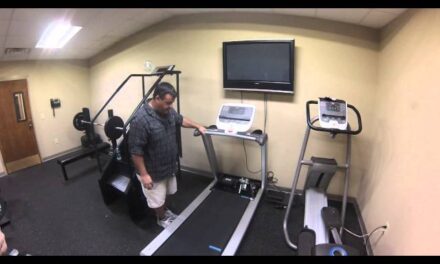Are you someone who values your health and wants to make the most out of your fitness routine? If so, you might have come across heart rate monitoring as a popular feature in many fitness gadgets and equipment. But have you ever wondered why heart rate monitoring is considered essential for some users? In this article, we will explore the various reasons why heart rate monitoring has become a must-have feature for individuals who are serious about their fitness goals. From tracking workout intensity to monitoring overall health, heart rate monitoring provides valuable insights that can help you optimize your workout and achieve better results. So let’s delve into the world of heart rate monitoring and discover why it has become an indispensable tool for fitness enthusiasts.
Why Might Heart Rate Monitoring Be An Essential Feature For Some Users?
Heart rate monitoring has become increasingly popular in the world of fitness and health. With advancements in technology, monitoring your heart rate during physical activity has never been easier. But why might heart rate monitoring be an essential feature for some users? Let’s explore the various reasons why tracking your heart rate can benefit your overall well-being and help you achieve your fitness goals.

This image is property of pixabay.com.
1. Monitoring Physical Activity
1.1 Measuring Exercise Intensity
One of the key benefits of heart rate monitoring is the ability to measure exercise intensity. By tracking your heart rate, you can determine how hard your body is working during a workout. This information is crucial for ensuring that you are pushing yourself enough to see results, but not overexerting yourself and risking injury.
1.2 Tracking Calorie Burn
Heart rate monitoring also allows you to accurately track the number of calories you burn during physical activity. By knowing your heart rate and the duration of your workout, you can calculate the intensity of your exercise and estimate the number of calories burned. This information can be invaluable for individuals who are trying to lose weight or maintain a healthy weight.
1.3 Evaluating Fitness Levels
Heart rate monitoring provides valuable insight into your overall fitness levels. By analyzing your heart rate data over time, you can see improvements in your cardiovascular endurance and track your progress towards fitness goals. This information can help you make adjustments to your training program and ensure you are continually challenging yourself.
2. Managing Health Conditions
2.1 Monitoring Cardiovascular Health
For individuals with cardiovascular conditions, heart rate monitoring is essential for managing their health. By keeping a close eye on their heart rate, they can identify any irregularities or abnormalities that may require medical attention. Tracking heart rate can provide early warning signs of potential heart problems and allow for prompt intervention.
2.2 Detecting Abnormal Heart Rhythms
Heart rate monitoring is particularly beneficial for detecting abnormal heart rhythms, such as atrial fibrillation. By continuously monitoring your heart rate, you can catch irregularities that may occur sporadically or intermittently. Early detection of these irregular heart rhythms can help prevent serious complications and ensure appropriate treatment can be administered.
2.3 Managing Hypertension
Individuals with hypertension can benefit from heart rate monitoring as well. By regularly measuring their heart rate, they can gain insight into how their blood pressure responds during physical activity or stressful situations. This information provides an opportunity to make necessary lifestyle changes or adjustments to medication to better manage blood pressure levels.
2.4 Assessing Recovery
Heart rate monitoring is an invaluable tool for assessing recovery after intense physical activity. By monitoring your heart rate during the recovery period, you can ensure that your heart rate returns to a normal range within a reasonable time frame. This metric helps prevent overtraining and allows for proper rest and recovery, reducing the risk of injury.
3. Enhancing Training Performance
3.1 Optimizing Workouts
Heart rate monitoring allows individuals to optimize their workouts by helping them find their target heart rate zones. By staying within these specific heart rate ranges, you can ensure you are maximizing the benefits of your workouts without pushing yourself beyond your limits. This information is especially beneficial for individuals looking to improve their cardiovascular fitness or endurance.
3.2 Preventing Overtraining
Overtraining can lead to a plateau in performance or even injuries. Heart rate monitoring can help prevent overtraining by providing real-time feedback on the intensity of your workouts. By monitoring your heart rate during exercise, you can take necessary rest days or adjust the duration and intensity of your workouts to prevent burnout and injury.
3.3 Monitoring Exercise Plateaus
When working towards fitness goals, it is common to reach a plateau where progress seems to stagnate. Heart rate monitoring can help identify exercise plateaus by tracking changes in heart rate during workouts. If your heart rate no longer reaches the target zones or remains consistently low, it may be an indication that you need to change your workout routine or increase the intensity to continue making progress.
4. Improving Weight Loss Efforts
4.1 Tracking Exercise Intensity for Fat Burning
Heart rate monitoring is crucial for individuals focused on weight loss. By tracking your heart rate during exercise, you can ensure you are maintaining an intensity that promotes fat burning. Staying within the target heart rate zone for fat burning allows your body to utilize stored fat as an energy source, aiding in weight loss efforts.
4.2 Monitoring Exercise Duration
For effective weight loss, the duration of your exercise sessions is as important as the intensity. Heart rate monitoring helps you keep track of the duration of your workouts, ensuring you are meeting the recommended guidelines for physical activity. By monitoring the time spent in the target heart rate zones, you can optimize the duration of your workouts to maximize calorie burn and weight loss.
4.3 Evaluating Weight Loss Progress
Heart rate monitoring can also help you evaluate the effectiveness of your weight loss efforts. By tracking changes in your heart rate over time, you can monitor improvements in cardiovascular health, which often align with weight loss. The data collected can provide you with tangible evidence of progress, boosting motivation and encouraging you to maintain healthy habits.

This image is property of pixabay.com.
5. Preventing Exercise-Induced Injuries
5.1 Identifying Overexertion
Heart rate monitoring is crucial for identifying signs of overexertion during physical activity. By comparing your current heart rate to your resting heart rate and considering factors such as duration and intensity, you can determine if you are exceeding your body’s limits. This information allows you to make necessary adjustments to prevent exercise-induced injuries.
5.2 Monitoring Recovery
After a strenuous workout, monitoring your heart rate during the recovery period is essential. By ensuring that your heart rate returns to a normal range within a reasonable time frame, you can prevent pushing your body too hard and risking injury. Tracking your recovery heart rate is an excellent indicator of your overall fitness level and can help you make informed decisions regarding post-workout rest and recovery.
5.3 Preventing Heat Exhaustion
Heart rate monitoring is particularly important during hot weather or intense physical exertion. By monitoring your heart rate and comparing it to your target heart rate zones, you can prevent overheating and heat exhaustion. If your heart rate exceeds recommended ranges, it may be an indication to take a break, cool down, and hydrate to prevent heat-related illnesses.
6. Customizing Training Programs
6.1 Setting Heart Rate Zones
Heart rate monitoring allows for the customization of training programs by setting specific heart rate zones. By determining your maximum heart rate and desired training goals, you can establish target heart rate zones for various types of workouts. This customization ensures that you are training at the appropriate intensity for your individual needs, optimizing the effectiveness of your training program.
6.2 Tailoring Workouts to Individual Fitness
Each individual has different fitness levels and goals, and heart rate monitoring helps tailor workouts accordingly. By tracking your heart rate during exercise, you can adjust the intensity or duration of your workouts to align with your current fitness level. This personalized approach ensures that you are challenging yourself appropriately and progressing towards your desired fitness goals.
6.3 Modifying Exercise Intensity
Heart rate monitoring also allows for easy modification of exercise intensity during workouts. By monitoring your heart rate in real-time, you can make adjustments to your exercise intensity as needed. For example, if your heart rate is consistently below the target range, you can increase the intensity to ensure you are getting the most out of your workout. On the other hand, if your heart rate is consistently above the target range, you may need to decrease the intensity to prevent overexertion.

This image is property of pixabay.com.
7. Tracking Overall Fitness Progress
7.1 Assessing Resting Heart Rate
Resting heart rate is a valuable metric for assessing overall fitness. By monitoring your heart rate upon waking, you can gauge your resting heart rate. As your cardiovascular fitness improves, your resting heart rate tends to decrease. Keeping track of this metric allows you to monitor your overall fitness progress and make necessary adjustments to your training regimen.
7.2 Monitoring Heart Rate Variability
Heart rate variability (HRV) refers to the changes in time intervals between consecutive heartbeats. HRV is an indicator of autonomic nervous system activity and overall physiological well-being. By regularly monitoring your HRV, you can assess your body’s readiness for exercise and detect signs of overtraining or fatigue. Tracking HRV provides insights into your overall health and helps you optimize your training program.
7.3 Comparing Training Sessions
Heart rate monitoring allows you to compare your heart rate data from different training sessions. By analyzing variations in heart rate during similar workouts, you can identify trends in your performance and identify areas for improvement. Comparing training sessions helps you understand how your body responds to different exercises, allowing for adjustments and modifications to achieve optimal results.
8. Supporting Exercise Goals
8.1 Maintaining Target Heart Rate
Heart rate monitoring helps individuals maintain their target heart rate during exercise. By continuously tracking your heart rate, you can ensure that you are staying within the desired heart rate zones for specific training goals, such as improving cardiovascular fitness or burning fat. This guidance ensures that you are maximizing the benefits of your workouts and moving closer to achieving your exercise goals.
8.2 Monitoring Intervals of High-Intensity
Interval training involves alternating between periods of high-intensity exercise and periods of rest or lower intensity. Heart rate monitoring is a valuable tool for monitoring these intervals and ensuring that you are achieving the desired intensity during the high-intensity periods. By staying within the target heart rate zones for high-intensity intervals, you can optimize the effectiveness of interval training and enhance your fitness levels.
8.3 Tracking Recovery Heart Rate
Recovery heart rate is an essential metric for evaluating cardiovascular fitness and recovery after exercise. By monitoring your heart rate during the recovery period, you can track how quickly your heart rate returns to normal levels following intense exercise. This information helps you assess your cardiovascular health and determine if adjustments to your training program or rest periods are necessary.
9. Increasing Motivation
9.1 Visual Feedback on Effort
Heart rate monitoring provides visual feedback on your efforts during exercise. Many fitness trackers and smartwatches display real-time heart rate data, allowing you to gauge the intensity of your workout at a glance. This visual feedback can boost motivation by providing immediate validation of your hard work and encouraging you to push yourself a little harder.
9.2 Seeing Progress in Real-Time
Tracking your heart rate in real-time during workouts allows you to see your progress as it happens. By observing changes in heart rate as you go, you can feel a sense of accomplishment and confidence in your abilities. Seeing progress in real-time can be highly motivating and encourages you to keep striving to reach your fitness goals.
10. Tracking Heart Rate During Daily Life
10.1 Monitoring Stress Levels
Stress has a significant impact on our overall well-being. Heart rate monitoring can help individuals track their stress levels by identifying changes in heart rate. Elevated or irregular heart rates can indicate increased stress levels, allowing individuals to take necessary measures to reduce stress and improve their overall health.
10.2 Assessing Resting Heart Rate Variations
Monitoring resting heart rate variations throughout the day can provide valuable insights into your body’s response to different situations or activities. Changes in resting heart rate can indicate emotional or physical stress, fatigue, or even the effectiveness of relaxation techniques. By regularly assessing these variations, you can make informed decisions to optimize your well-being.
In conclusion, heart rate monitoring is an essential feature for individuals looking to improve their fitness and overall health. From optimizing workouts to preventing injuries and tracking progress, heart rate monitoring provides valuable insights and guidance. By utilizing this technology, individuals can tailor their training programs, set achievable goals, and stay motivated on their fitness journey. Whether you are an athlete, a weight loss enthusiast, or simply someone striving for a healthier lifestyle, heart rate monitoring can be a game-changer in achieving your fitness goals.





